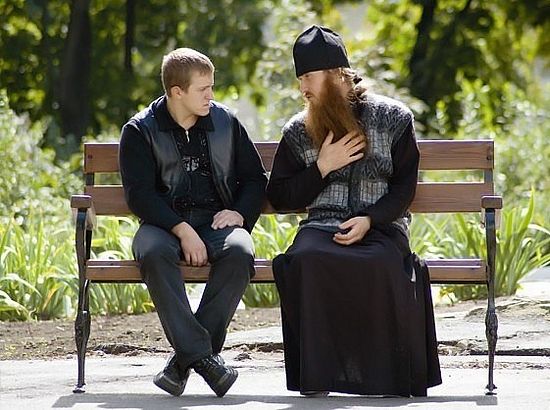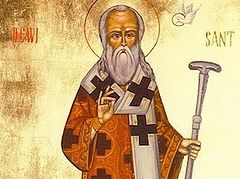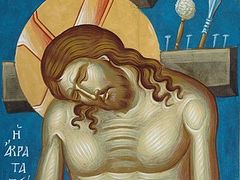There is a beautiful story passed down to us of a time when the St. Paul the Hermit visited St. Anthony the Great. I have become convinced that it is a story that all priests and Church leaders need to hear:
One day, Paul the Hermit visited Father Anthony while Anthony was instructing three monks about a difficult theological matter of the faith. Paul withdrew into the corner and waited until Anthony was ready to meet.
Anthony proceeded to ask the youngest of the three monks his thoughts on the theological matter. The first young man responded quickly; what he lacked in his knowledge on the subject, he supplemented with his fire and exuberance. When the young man was finished, Father Anthony remained silent for a bit, then said, “You haven’t found the right answer yet.”
Then the second monk was given the floor. He was a little older than the first, and he had read some books and gained some experience. He chose heady words and formulated them more carefully than the previous monk. When he was finished giving his thoughts on the subject, Father Anthony said to the monk: “You too have not found the right answer yet.”
Finally, the oldest of the three monks was given the opportunity to answer. He dropped long silences, spoke thoughtfully, and you could tell he had read many theological books and had experience with prayer. When he was finished, Father Anthony remarked: “You haven’t found the right answer yet.”
Before Anthony opened his mouth to say something about the difficult theological matter, Anthony turned to Father Paul, the old abbot, and asked, “Father Paul, could you possibly say something about the subject?” Now Paul remained silent for some time. Finally, Paul said: “I don’t know…”
Father Anthony then turned to his three disciples and with a raised finger, he said to the monks: “Father Paul has found the right answer.”
As a priest or as an Orthodox Christian in general, we are often asked a lot of questions about a myriad of theological topics. Often, we have in the back of our minds 1 Peter 3:15, which implores us to Always be prepared to give an answer to every man… If you happen to have theological training, you might be incredibly excited to provide every fact about a certain subject especially when the question ventures into one of your areas of theological interest.
But how do we respond to theological questions when we have no earthly idea of what an appropriate answer might be? Does our pride take over and do we grow fearful about how we might appear not having an answer to a question? I mean the priest should have all the answers, right? Maybe not.
I fear that when our pride takes over, or our ego is inflated, or when our immaturity abounds, we simply go the route of making up answers to theological question. If we were answering silly hypothetical questions offered by our children about unicorns or dinosaurs or super-heroes, then the flippant answers might be appropriate. I fear that our tendency to feel as though we must always have answers to theological questions can have drastic repercussions. What may seem like a small question to us might have someone’s soul on the line if we indeed attempt to answer, “shooting from the hip” or answering when we have no idea of what we are talking about. I have come to the wisdom of embracing the “I don’t know” approach to theological questions via a very painful route. It is my hope that my personal failure can help convince you to also consider, like St. Paul the Hermit, adding the words “I don’t know” to your vocabulary as you face difficult theological questions.
***
Quite a few years ago, I was newly graduated from a Protestant Bible College. I had landed one of the most desirable pastoral positions at a local mega-church that had a thousand members. As a twenty-something pastor, I was armed with a charismatic preaching style, trendy clothes, and I knew a whopping thirty Koine Greek words. In my pastoral role, one of the duties I was assigned was to teach a course for those interested in becoming members of our church. In this course, I taught the church’s respective Protestant systematic theology, some Church history, and a bit about structure of our church model and leadership.
I remember one class that I led, as if it was yesterday. In that class, I was teaching twenty-three folks about the topic of Baptism. For my respective church at that time, and what I was taught in Bible college, the theological importance of Baptism can be understated. Laying out the theological specifics about Baptism to the class using my education training and the thirty Greek words that I knew, the logic for my class went something like this in regard to Baptism:
-
A person must be baptized as an adult; there was to be no Baptisms of babies or children in that respective Protestant tradition
-
When you are baptized, you receive the Holy Spirit
-
When you have the Holy Spirit, you are a Christian
-
When you are a Christian, you’ll go to Heaven
Clearly, this is not what Orthodox Christians believe, but again, this is what my Protestant church taught, what I learned in Bible college, and what I fully (and naively) believed at the time. I argued my four theological points in a very convincing way utilizing my few Greeks words and picking verses from the New Testament to prove my points as if I was picking foods at a buffet. With my bravado, I remember thinking that the class was going smoothly. Surely, I had all the answers about every theological topic!
Then I heard quiet sobbing coming from the back of the room.
I noticed that the weeping was coming from a young woman, maybe in her mid-thirties, who sat toward the back of the class. Stupidly, with all my lack of pastoral aptitude, I asked the young woman if she would be willing to share with the class what had made her cry. Between sobs, she shared a heart-wrenching experience that happened to her and her husband a few years prior.
She shared with the class about what was meant to be one of the most beautiful days of her and her husband’s lives: a day where they would welcome their new son into the world. At the hospital, after a painful birthing process, while they held their newborn son, their doctor told them the devastating news that their son would not live but a short while. Knowing that the young parents were Roman Catholic, the doctor recommended that they contact their local Catholic priest immediately so that he could baptize the child and give the baby Last Rites. They called the priest as they were instructed, but sadly the baby reposed before the priest arrived.
After sharing this devastating and heart-wrenching story with the class, the young woman with tears in her eyes turned to me and asked: “Do you think my son is in Heaven?”
Again, I had previously laid out my strong logic about Baptism to the class: Only adults are to be baptized, no babies; those that were baptized get the Holy Spirit; after receiving the Holy Spirit, you were then a Christian; and Christians go to Heaven. This is what my church believed, this is what I was taught, and this is what I staunchly believed.
I turned to the weeping woman and with the most pastoral and caring voice I said to her, “No, ma’am, I don’t think your son is in Heaven.”
I can only describe with limited words what I then experienced. I floated out of my body and I hovered above the classroom. I could see the participants in the class not moved by the interaction that they just witnessed, some even nodding their heads in agreement with my response. I also saw myself, the epitome of a Pharisee; a religious leader withholding mercy, withholding grace, withholding love. I resigned shortly thereafter from my ministerial role.
***
Clearly, had I met that woman’s question as an Orthodox Christian I guarantee I would have given a better response. Maybe I would have said nothing at all and simply asked if I could give her hug and mourned with her. Or maybe, having had Orthodox faith and theology from the beginning, I could have explained to her how God is love and that He is the Great Lover of mankind and how we don’t have to fear Him as if He were a character from Dante’s Inferno. Really, any answer but the one I gave would have been better.
Maybe “I don’t know” wasn’t the perfect phrase for that moment, although I can assure you that my heartless and prideful answer was not the right answer. My answer lacked love and it lacked any semblance of the Gospel. Maybe like our Father Paul, we as Orthodox Christians and followers of the risen Lord Jesus, are not called to always give a theological treatise to every theological question. Maybe we are called to respond from a place of humility and not our pride. Maybe silence or weeping with someone in their brokenness and confusion is what the question calls for in that moment. And maybe the best answer to the difficult theological questions is simply to meet others in their pain, to offer our compassion, and to sacrificially show our love to them precisely what was modeled for us by our Lord and Savior, Jesus Christ.




